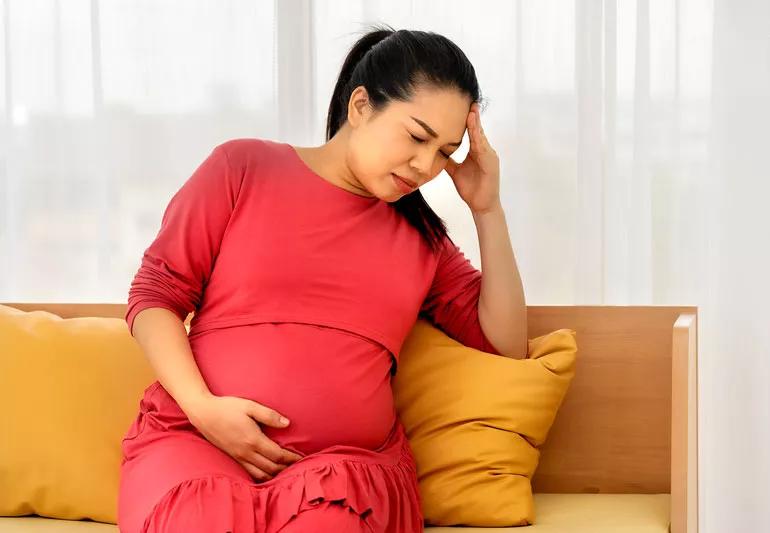They usually subside after the first trimester, but stay hydrated and rested, too

Image content: This image is available to view online.
View image online (https://assets.clevelandclinic.org/transform/99158687-b0a0-4b8b-a858-d7e385fb3918/pregnantHeadache-1154884258-770x533-1_jpg)
Pregnant woman with headache sitting on couch
Pregnancies are like seashells: No two are exactly alike — which is why you may have experienced headaches and even pounding migraine pain while others enjoy 40 weeks of pure bliss.
Advertisement
Cleveland Clinic is a non-profit academic medical center. Advertising on our site helps support our mission. We do not endorse non-Cleveland Clinic products or services. Policy
Headaches during pregnancy can be caused by hormones, an increase in your blood volume or even other triggers like lack of sleep and stress.
And it’s important to talk to your Ob/Gyn if you’re having headaches, as the medications and treatments you may have used in the past may not be right for you during your pregnancy.
Julia Bucklan, DO, explains pregnancy headaches and what you can do to alleviate pain.
You’ve got a headache. Early pregnancy might be to blame. Most of the time, there tends to be an increase in headaches and migraines during your first trimester.
What do early pregnancy headaches feel like?
Headaches fall into two categories: secondary and primary. Secondary headaches are caused by an underlying health problem, such as a sinus infection or high blood pressure. Primary headaches are self-contained — the pain you feel is a direct result of the headache itself. Migraines are a classic example.
If you get migraines, you might experience:
If you experience a migraine while pregnant, it often can go hand-in-hand with aura, too. Aura is a temporary sensory disturbance that may include visual changes, numbness and tingling, or speech changes.
Advertisement
The good news?
“Most women see an improvement in the number of migraines they experience as their pregnancy goes on,” says Dr. Bucklan.
So, what is it about having a bun in the oven that makes your head hurt (other than thinking about college tuition)? Blame it on the hormones. The very things that help your body keep your fetus healthy and nourished also up your headache quota. So does an increase in blood volume, which happens during the first trimester.
Other factors that lead to headaches during pregnancy include:
More than a quarter of women have migraines during reproductive years. Those who have migraines are more likely to have them during pregnancy as well. But in cases involving secondary headaches, causes include:
“We look at everyone closely and assess their symptoms,” states Dr. Bucklan. “The first question we want to answer is, ‘Is this a primary headache or a warning sign of an underlying condition?’”
It’s no fun to have a headache. Pregnancy can also mean that if you typically turn to over-the-counter pain medications like NSAIDs (ibuprofen, aspirin and naproxen) to fight headache pain, you’ll typically need to avoid these options during your pregnancy.
So, what can you do to help with pain and other symptoms? Dr. Bucklan recommends these seven tips:
Advertisement
Even though it’s common to experience headaches and migraines while pregnant, you should discuss your headaches with your healthcare provider or Ob/Gyn.
And it’s especially important to contact your doctor if you experience:
Your provider will determine if your head pain is caused by hormonal changes or certain triggers. And if it’s a secondary headache that’s brought on by an underlying condition, they’ll work to treat that condition, which, in turn, should help your headaches.
Dr. Bucklan reiterates that it’s wise to include your doctor in any decision-making, especially when considering medication.
“It should be a joint and educated decision between the patient, their neurologist and often, their Ob/Gyn,” she stresses. “Together, we determine the best treatment approach for primary or secondary headaches.”
Advertisement

Sign up for our Health Essentials emails for expert guidance on nutrition, fitness, sleep, skin care and more.
Learn more about our editorial process.
Advertisement
Most rashes aren’t dangerous — but it’s worth talking to your pregnancy provider about them
The best available evidence indicates that, used correctly, acetaminophen is safe to take throughout a pregnancy
Prenatal massage, done properly, is a safe and effective way to lower stress and relieve pregnancy discomforts
Avoid high-mercury fish and processed meat, and go easy on salt and caffeine
Unless your healthcare provider tells you otherwise, it’s typically considered safe to have sex during pregnancy
Hot tubs and saunas raise your body temperature and can pose risks
Baths can be safe if you turn down the temp, avoid irritating bath products and take extra precautions against
SSRIs are the safest antidepressants to take in pregnancy — and pose less risk than unmanaged depression
Prioritize your health by managing stress, strengthening your social connections and getting quality sleep
Bolsters, blankets, pillows and blocks can offer extra support, stability and comfort
Allergies, postnasal drip, asthma or reflux could be to blame for a cough that won’t quit